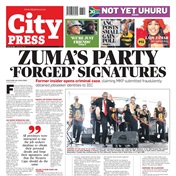Deputy chairperson of the National Council of Provinces Raseriti Tau almost collapsed a recent parliamentary debate when he ruled that the word ‘rubbish’ was unparliamentary, despite the fact that presiding officers had ruled in favour of the term seven times before.
From ‘chihuahua’ to ‘charlatans’, and obvious ones such as ‘cockroach’ and ‘bobbejaan’, these are just some of the words deemed unparliamentary in a list that has expanded over the past 22 years.
Unparliamentary language is defined as remarks or expressions that are contrary to the provisions of Parliament’s rules and agreed practice. These include offensive, provocative or threatening language in the House, as well as personal attacks, insults and obscene language.
In recent weeks, there has been a flurry of new rulings on the language used in the House – including one forbidding the coinage ‘Zuptas’, a recently adopted portmanteau used by opposition parties to highlight claims of close relations between President Jacob Zuma and the Gupta family.
The rulings coincide with politicians’ rising tempers as local government elections approach.
What is important in determining unparliamentary language is the precedents that have been set by the rulings of former presiding officers. While the National Assembly’s Guide to Procedure, a 2004 document, informs MPs and presiding officers about what is unparliamentary, the rules specify that “no member shall use offensive or unbecoming language”. Parliament’s 24-page document of “unparliamentary expressions” also features phrases that were challenged by MPs but remain acceptable.
Parliament spokesperson Luzuko Jacobs explained that the presiding officer was charged with the responsibility to rule on matters, including unparliamentary expressions, guided by the law, as well as rules, precedent and context.
“A standing order, adopted by the House during the first fixed-term parliamentary sitting (1994 to 1999), provides that a member who wishes to bring to the House’s attention allegations of improper conduct against another member must do so by way of a substantive motion,” he said.
So what happens when an MP is aggrieved by a ruling?
“That member may write to the presiding officer and ask that the principle or subject of the ruling be referred to the rules committee,” he said.
The very first ruling on unparliamentary expressions back in 1994 was for the word ‘babalazi’ (hangover).
While ‘bobbejaan’ (baboon) is unparliamentary, ‘bobbejaan spanner’ (pipe wrench, a plumbing tool) is allowed. But just why an MP would refer to another as a plumbing tool is baffling.
Parliamentary observers would know that saying an MP is lying, or a liar, is forbidden. And whatever you may think of our public representatives, you cannot call them criminals, corrupt, racist, scum, dishonest, sellouts, idiots or psychopaths. That would be unparliamentary too.
And despite a number of MPs having admitted to defrauding Parliament of millions of rands in the Travelgate scandal, referring to them as “Travelgate thieves” is also unparliamentary.
Surprisingly, saying an MP is “stupid” is allowed, according to a ruling in 2000, but referring to their “blatant stupidity” is not.
The list is littered with references to animals, all of which are deemed unparliamentary. Yet no one has ever challenged the description “young lions”, a reference to the ANC Youth League.
Animal sounds are also forbidden.
Clearly, MPs love using Afrikaans expressions to insult each other – presiding officers have had their hands full ruling on a plethora of terms, including ‘jou moer’, ‘raasgat’; ‘lawaaigat’, ‘oubaas se honne’, ‘sies’, ‘slinkse’, ‘baas boy’, ‘suurgat’ and ‘meisietjie’.




 Publications
Publications
 Partners
Partners








